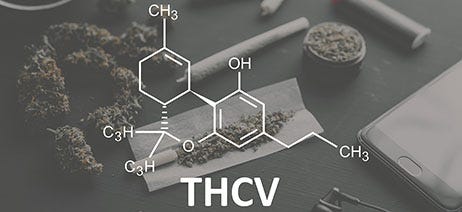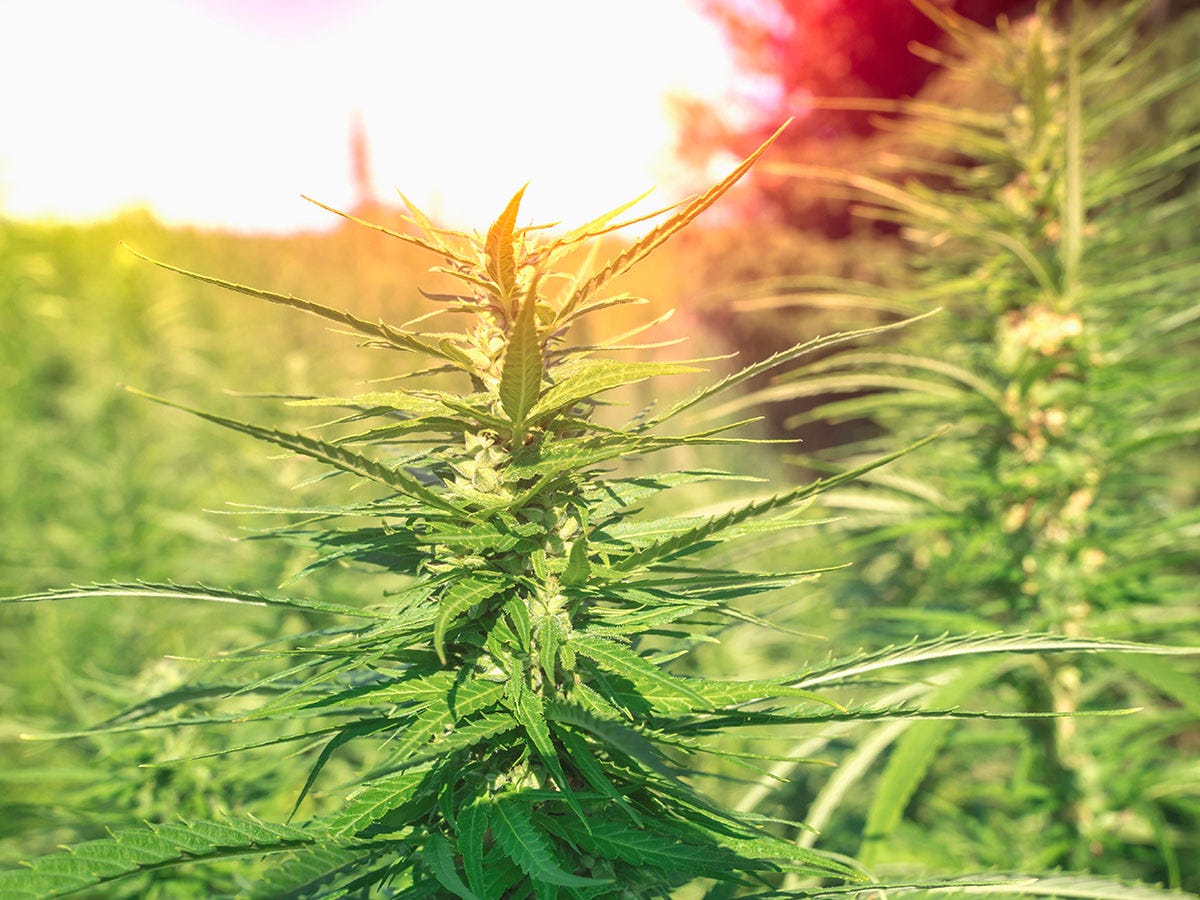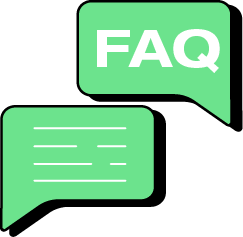
What Is THCV & How Is It Different From THC?
THCV (tetrahydrocannabivarin) is a much-hyped cannabinoid that’s gaining popularity for its potentially unique benefits. While chemically similar to its cousin THC, THCV is quite different and does not produce psychoactive effects. In this article, we look at what makes THCV different from other cannabinoids and answer all your questions, including:
- What Is THCV & How Does It Work?
-
What Are the Potential Benefits & Effects of THCV?
-
How Is THCV Different From Other Cannabinoids?
-
How Do You Use THCV?
-
Frequently Asked Questions About THCV
What Is THCV & How Does It Work?
THCV (tetrahydrocannabivarin) is a cannabinoid that has a similar chemical structure to its cousin THC, mimicking the intoxicating effects of THC but only when consumed in large quantities.1 It is derived from THCVA, becoming THCV during decarboxylation, which is the process that activates cannabinoids when plant material is heated or exposed to lots of light. It interacts with the endocannabinoid system in various ways, offering potential therapeutic benefits without the same effects of THC.2


This tricky cannabinoid works differently than most others. The “high” associated with cannabis consumption is due to the way THC activates the CB1 receptor in the body’s endocannabinoid system. In small quantities, THCV does not interact with the CB1 receptor, meaning it does not produce psychoactive effects.2 However, when taken in large doses, THCV can impact the CB1 receptor to create a quick, “buzz-like” effect.2 There isn’t much known yet about this experience, though, likely because THCV is only found in trace amounts in most cannabis strains.2
What Are the Potential Benefits & Effects of THCV?
Pop culture has given THCV quite a few unique nicknames, including “diet weed.”3 However, it’s important to understand that more research is needed to understand this cannabinoid’s potential. Preliminary studies suggest that THCV may have several benefits.
- Appetite Suppressant - There is a theory that since THCV can block the CB1 receptor, which is associated with stimulating the appetite, it may actually reduce food cravings.3 There have been several small studies that indicate this may be true, and further research is needed.1
- Diabetes - Human studies are limited when it comes to cannabis, but the American Diabetes Association conducted a randomized, double-blind, placebo-controlled study on patients with Type 2 Diabetes, and found that THCV significantly decreased blood sugar levels.4 Additional studies have also shown that THCV may improve insulin sensitivity and lower blood sugar.5
- Tremor Reduction - Early animal studies have shown that THCV may reduce tremors associated with conditions like Parkinson’s disease and could delay the progression of the disease.6
How Is THCV Different From Other Cannabinoids?
While THCV shares some chemical similarities with other cannabinoids, its effects are quite distinct. Here’s how THCV compares with THC, CBD, and Delta-8 THC:
THCV vs THC
One of the main differences between THCV vs THC is the effect on appetite. While THC is known for stimulating hunger, THCV likely does the opposite by suppressing it. Other key differences include the highly psychoactive nature of THC, versus the potential for intoxicating effects when THCV is consumed in high doses.1
THCV vs CBD
CBD is a major cannabinoid that is found in abundance in cannabis plants. However, THCV is not so easily found, and has not been studied anywhere near as much as CBD.
THCV vs Delta-8 THC
Delta-8 THC is a highly controversial cannabinoid that is not widely understood. It does occur naturally in hemp plants but only in small amounts. As a result, most of the Delta-8 THC products on the market are synthetic.7 THCV is found naturally in the cannabis plant, and it is particularly common in African landrace strains, like Durban Poison.
How Do You Use THCV?
THCV is available in a variety of cannabis products, including vapes and edibles. Many cannabis enthusiasts may choose edibles and vapes that contain concentrated levels of THCV for its reported therapeutic benefits.
While the overall amount of THCV concentration is low in cannabis plants, it is higher in African landrace strains. Durban Poison, for example, is known as a THCV-rich strain. Other strains with naturally higher THCV concentrations are Power Plant, Jack the Ripper, Skunk #1, Durban Cheese, Pineapple Purps, Willie Nelson, and Doug’s Varin.8


FAQs About THCV
As the cannabinoid gains popularity, you may have questions about THCV effects, legality, and how it compares to other cannabinoids like THC and CBD. While you are always welcome to ask your favorite budtender any THCV-related questions, here are some of the most commonly asked ones:
Is THCV legal?
Whether THCV is legal or not depends on the state. If your state has legalized recreational or medical cannabis, then THCV is legal as well.
Is THCV synthetic?
No, THCV occurs naturally in the cannabis plant.
Does THCV get you high?
THCV may produce psychoactive effects, depending on the amount taken. However, it is reported that the impact does not last as long as THC.


More About THCV
THCV is still a relatively new cannabinoid in terms of research and public awareness. But its potential benefits and applications are exciting. As studies continue to explore its effects, THCV may prove to be a valuable tool to help manage appetite, support metabolic health, and serve as an anticonvulsant. Talk with your budtender to learn more about this cannabinoid and whether it’s right for you.
Sources:
1. “THCV: The Complete Guide to Tetrahydrocannabivarin,” Way of Life, May 14, 2024, https://wayofleaf.com/cannabis/science/thcv-tetrahydrocannabivarin/
2. “Is the Cannabinoid THCV Psychoactive?” Leafly, September 30, 2020, https://www.leafly.com/news/science-tech/is-thcv-psychoactive
3. “Unpacking the Hype Around THCV, aka ‘Diet Weed,’” Healthline, August 19, 2021, https://www.healthline.com/health/substance-use/thcv
4. “Efficacy and Safety of Cannabidiol and Tetrahydrocannabivarin on Glycemic and Lipid Parameters in Patients With Type 2 Diabetes: A Randomized, Double-Blind, Placebo-Controlled, Parallel Group Pilot Study,” American Diabetes Association, September 13, 2016, https://diabetesjournals.org/care/article/39/10/1777/129/Efficacy-and-Safety-of-Cannabidiol-and
5. “New Study Finds Weight Loss With THCV And CBD,” Forbes, May 15, 2024, https://www.forbes.com/sites/emilyearlenbaugh/2024/05/15/new-study-finds-weight-loss-with-thcv--cbd/
6. “Symptom-relieving and neuroprotective effects of the phytocannabinoid Δ9-THCV in animal models of Parkinson's disease,” British Journal of Pharmacology, August 2011, https://www.ncbi.nlm.nih.gov/pmc/articles/PMC3165958/
7. “Delta-8 THC: What You Need to Know About This Cannabinoid,” WebMD, September 13, 2023, https://www.webmd.com/mental-health/addiction/what-is-delta-8
8. “What is THCV and what are the benefits of this cannabinoid?” Leafly, September 27, 2022, https://www.leafly.com/news/cannabis-101/what-is-thcv-and-what-are-the-benefits-of-this-cannabinoid


